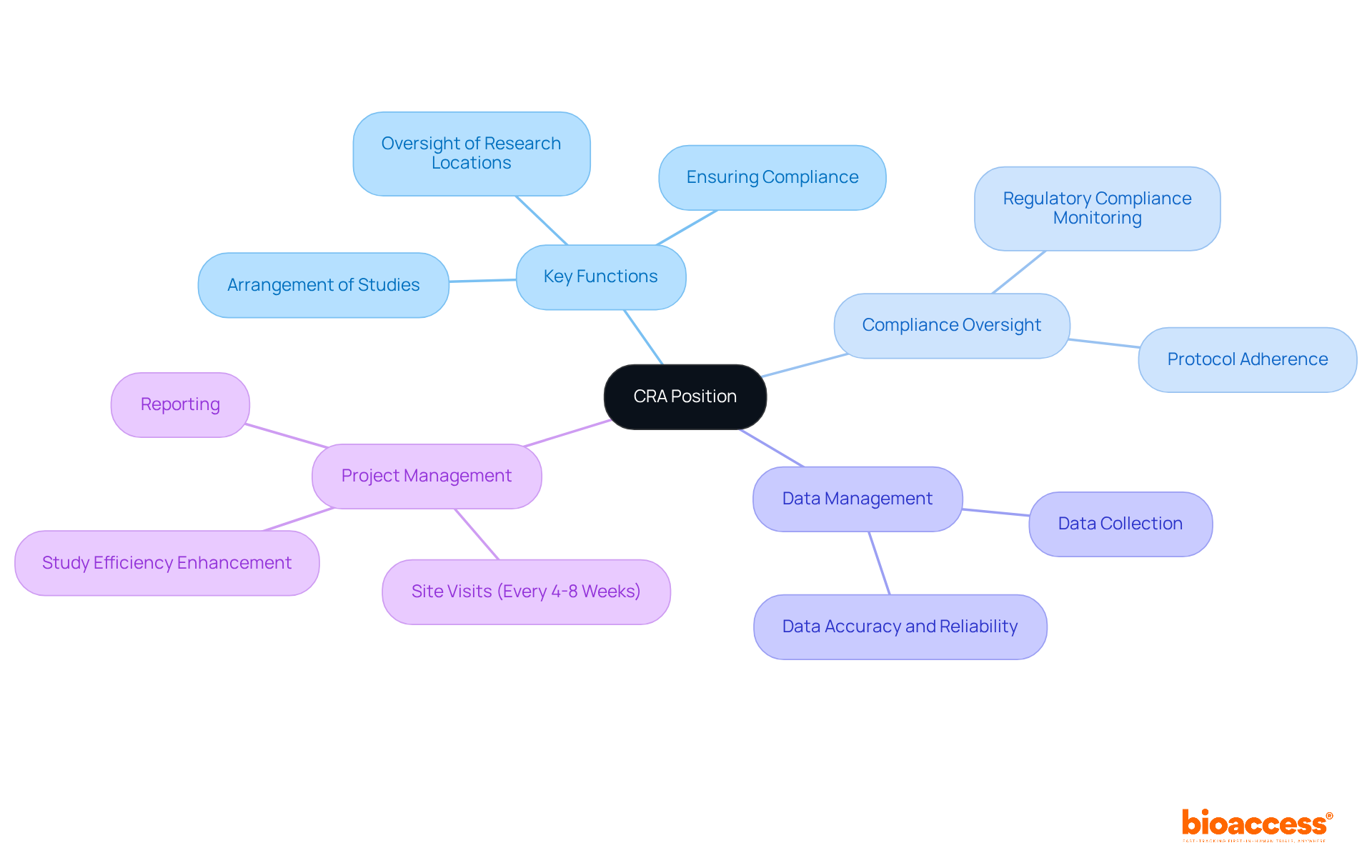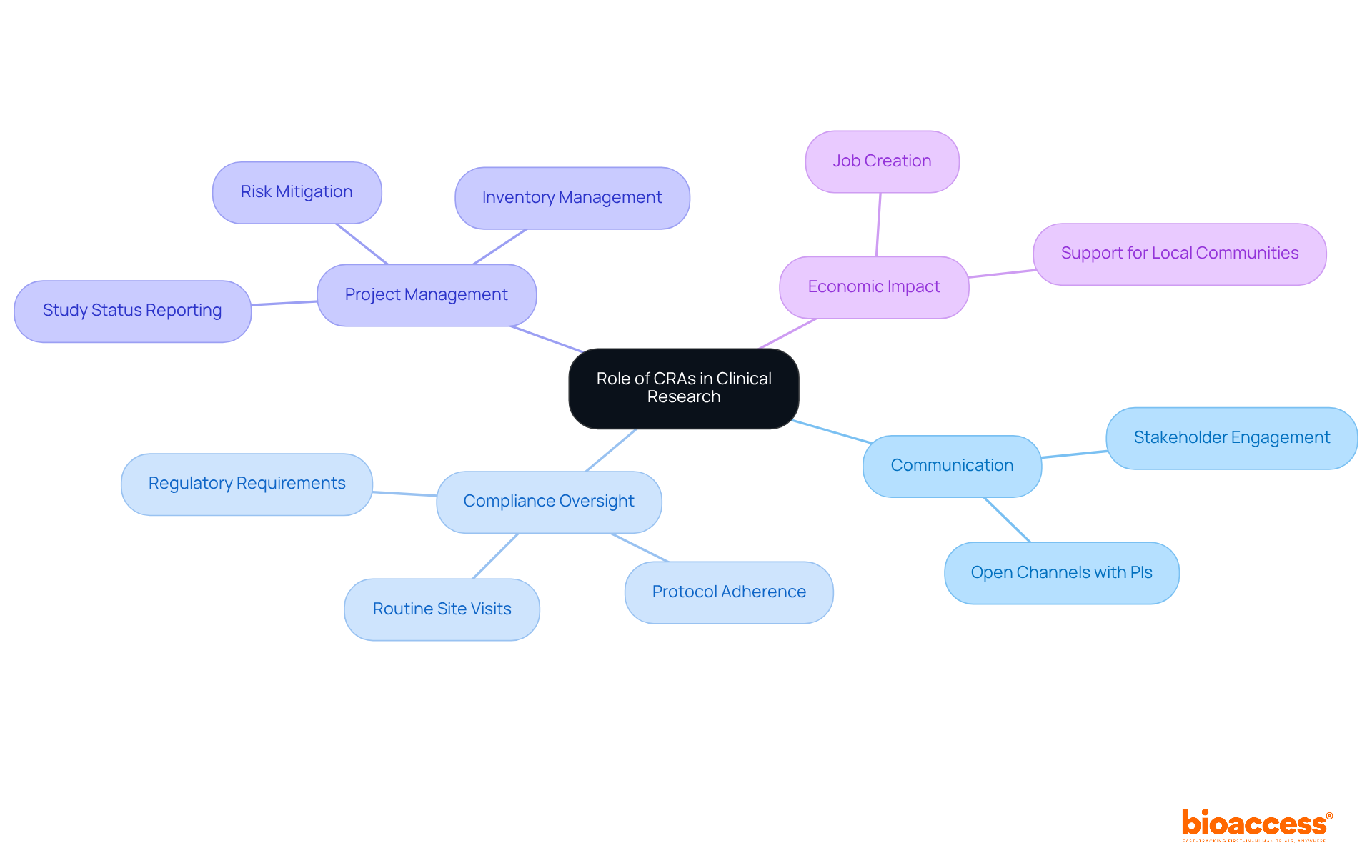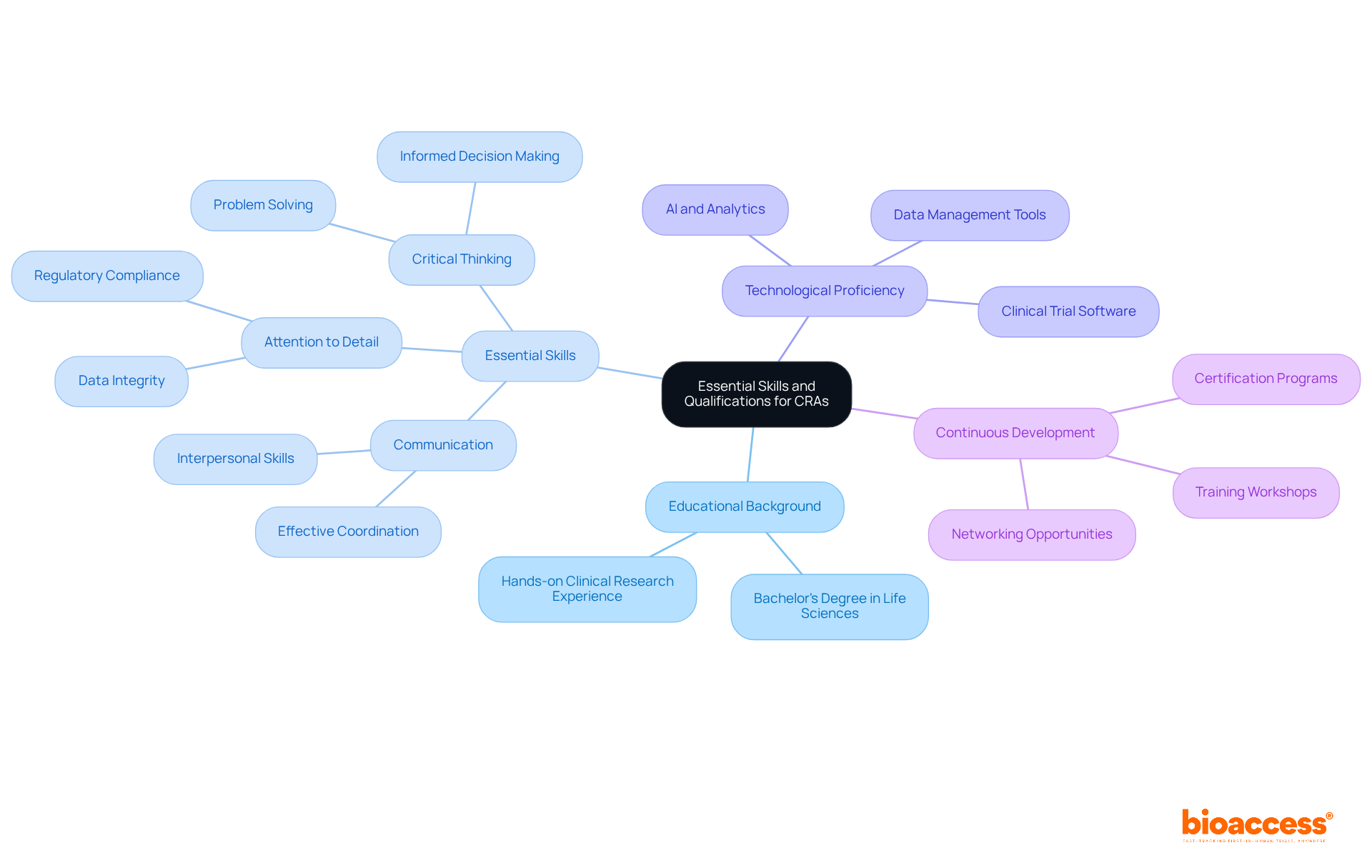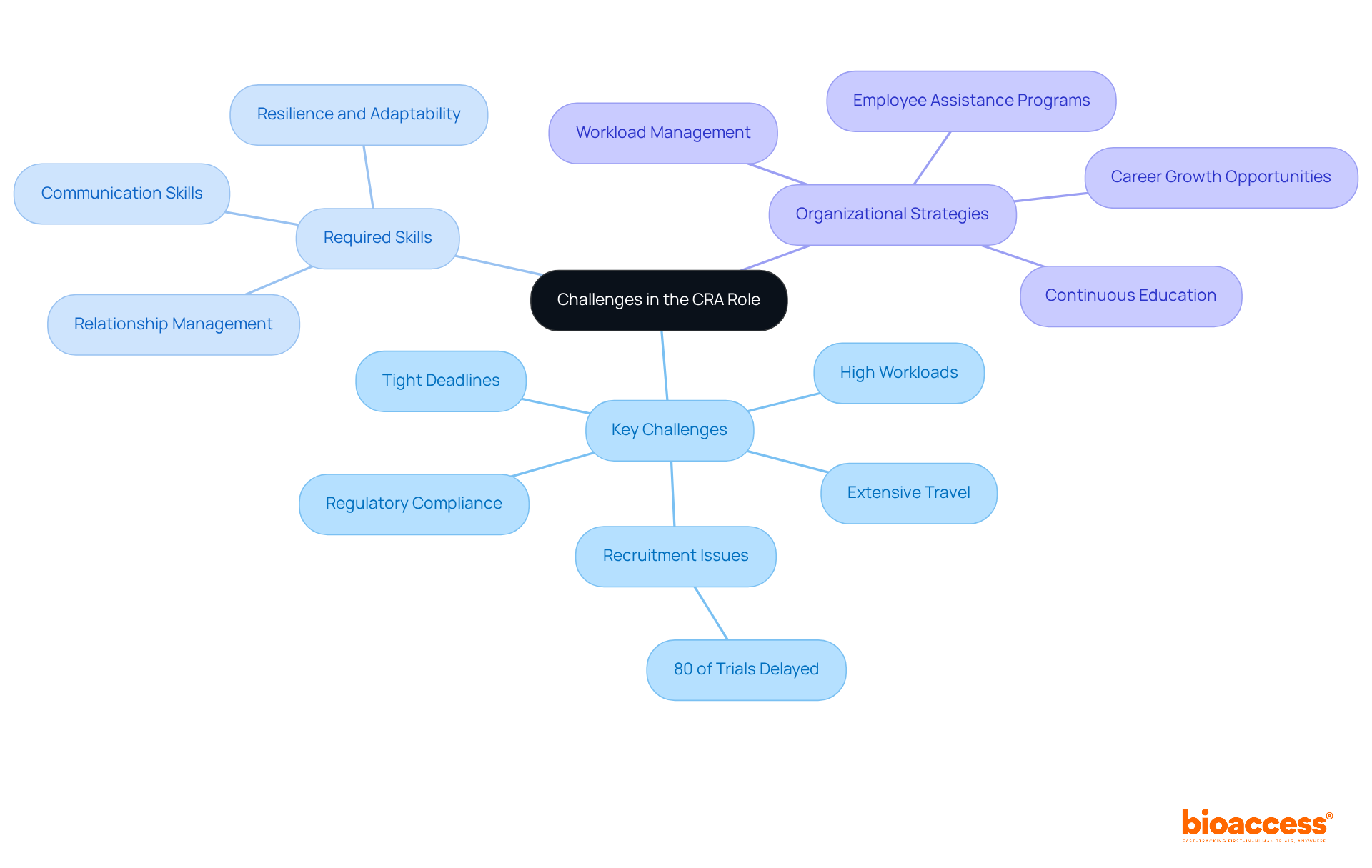


This article highlights the pivotal roles and impacts of Clinical Research Associates (CRAs) in clinical research, underscoring their responsibilities in ensuring compliance, maintaining data integrity, and fostering effective communication between sponsors and research sites. By detailing their essential functions—such as conducting site visits, managing regulatory compliance, and facilitating project management—it emphasizes how these tasks are crucial for enhancing research quality and advancing medical science.
The expertise of CRAs not only supports the integrity of clinical trials but also contributes significantly to the advancement of healthcare solutions. Understanding the multifaceted roles of CRAs is vital for stakeholders in the clinical research landscape, prompting a closer look at how their contributions shape the future of medical research.
The role of Clinical Research Associates (CRAs) is often overshadowed in discussions about clinical trials; however, they are the linchpin that connects sponsors to research sites. By ensuring that studies comply with regulations and achieve their intended outcomes, CRAs play a crucial role in the research process. Their meticulous oversight safeguards the integrity of data and enhances participant safety, making their contributions vital to the success of clinical investigations.
As the landscape of clinical research evolves, CRAs encounter mounting challenges, including regulatory complexities and high turnover rates. How can these professionals navigate such obstacles while continuing to advance medical science?
The CRA position serves a pivotal role in the success of clinical investigations, acting as the primary link between project sponsors and research locations. Their responsibilities in the CRA position encompass a range of essential functions, including:
The CRA position is critical in confirming that studies are conducted in accordance with established protocols, Good Clinical Practice (GCP), and relevant regulations.
Beyond compliance oversight, the CRA position held by CRAs is integral to data collection and management, ensuring the accuracy and reliability of all data. This meticulous attention to detail is vital for preserving the integrity of the research, as any discrepancies can jeopardize the validity of experimental outcomes. Approximately 70% of individuals in the CRA position are engaged in regulatory compliance monitoring, underscoring their significance in safeguarding the research process.
The effective management of studies by research associates in the CRA position is exemplified in various case analyses, where their proactive involvement has led to enhanced study efficiency and participant safety. For instance, those in the CRA position routinely conduct site visits every 4-8 weeks to ensure that all elements of the study are functioning smoothly and that any challenges are promptly addressed. This dynamic role not only elevates the quality of medical research but also plays a crucial part in the overall advancement of medical science.
At Bioaccess, the CRA position involves Clinical Research Associates who are instrumental in guiding the extensive process of advancing medical device evaluations, which includes:
Their expertise is particularly valuable in navigating regulatory hurdles and expediting the approval process, enabling a sprint regulatory approach in the CRA position that can achieve approvals in as little as 6-8 weeks. This efficiency is essential for medical device startups facing challenges in patient recruitment and financial constraints, ultimately fostering economic growth and enhancing healthcare.

The CRA position is vital as Clinical Research Associates (CRAs) serve as the crucial link between study sponsors and research sites, ensuring alignment and efficient communication among all involved parties. Their role is vital in upholding the quality and integrity of research studies in the CRA position, as they rigorously oversee adherence to established protocols and regulatory requirements. Routine site visits, conducted frequently throughout the research process, enable individuals in the CRA position to assess study progress, address arising issues, and prioritize patient safety. This proactive involvement not only enhances the reliability of the data collected but also fosters trust among stakeholders, which is essential for the successful execution of research.
Within the context of Bioaccess's comprehensive clinical study management services, the CRA position of CRAs is indispensable for the feasibility and selection of research locations and principal investigators (PIs). They significantly contribute to reviewing and providing feedback on research documents to ensure compliance with country-specific requirements, facilitating trial setup, and securing necessary approvals from ethics committees and health ministries. Furthermore, in the CRA position, CRAs play a pivotal role in managing import permit processes and the nationalization of investigational devices, ensuring meticulous handling of all regulatory aspects.
Moreover, the CRA position is integral to project management and monitoring, which encompasses reporting on study status, inventory, and adverse events. Their oversight is crucial in mitigating risks associated with data management and compliance failures, thereby preserving data integrity. By promoting open channels of communication and ensuring adherence to best practices, the CRA position is instrumental in the overall success of research initiatives. Their efforts not only enhance trial quality but also support job creation and economic growth within local communities, driving international collaboration and innovation in the Medtech sector.

To excel as a Clinical Research Associate (CRA), candidates typically need a bachelor's degree in life sciences or a related discipline, complemented by hands-on clinical research experience. Essential skills for the CRA position of Clinical Research Associates involve robust communication and interpersonal capabilities, which are crucial for successful cooperation with various teams and stakeholders. Attention to detail is vital in the CRA position, as Clinical Research Associates are tasked with ensuring adherence to regulatory standards and preserving the integrity of study data. Furthermore, critical thinking abilities are essential, enabling Clinical Research Associates to navigate intricate situations and make informed choices that affect patient safety and study results.
Proficiency in data management and familiarity with clinical trial software significantly enhance a CRA's effectiveness. As the industry increasingly embraces advanced technologies, such as electronic data capture and AI-driven analytics, clinical research associates must stay informed of these developments to remain competitive. Continuous professional development is crucial; participating in training programs and certification courses can equip clinical research associates with the latest knowledge and skills essential for career advancement. For instance, certification from recognized institutions not only validates expertise but also improves job prospects and professional credibility, making candidates more attractive to employers.
In summary, aspiring clinical research associates should focus on building a robust educational foundation, honing essential skills, and committing to lifelong learning to thrive in this dynamic field.

The CRA position involves numerous challenges that can significantly impact job satisfaction and performance. In the CRA position, individuals frequently face high workloads, extensive travel, and tight deadlines, contributing to a notable turnover rate of 32% as of 2022. This turnover is further exacerbated by the demanding nature of patient recruitment and retention, with approximately 80% of clinical trials experiencing delays due to recruitment issues. Additionally, navigating complex regulatory environments adds another layer of difficulty, as those in the CRA position must ensure compliance with ever-evolving guidelines while managing various stakeholders, including investigators, sponsors, and regulatory bodies.
To effectively tackle these challenges, community representatives must refine their communication and relationship management skills. Building strong connections with stakeholders is crucial for facilitating smooth operations and ensuring trial success. Moreover, developing resilience and adaptability is essential for managing stress and preventing burnout. Strategies such as prioritizing tasks, utilizing technology for data management, and seeking mentorship can empower CRAs to navigate their demanding CRA position more effectively.
Case studies demonstrate that organizations prioritizing employee assistance and career growth opportunities experience reduced turnover intentions among employees in the CRA position. For instance, enhancing workload management practices and providing clear paths for advancement can significantly improve job satisfaction. By fostering a supportive work environment and encouraging continuous education, organizations can empower CRAs in their CRA position to thrive, ultimately contributing to the advancement of clinical research.

The CRA position is indispensable in the realm of clinical research, serving as the essential bridge between sponsors and research sites. The effectiveness of Clinical Research Associates (CRAs) directly influences the integrity, compliance, and overall success of clinical trials, making their role critical in advancing medical science and ensuring patient safety.
Throughout this discussion, the key functions of CRAs have been highlighted, including their responsibilities in:
The proactive involvement of CRAs in site visits, feasibility assessments, and project management enhances the quality of research and fosters economic growth within the healthcare sector. Furthermore, the importance of essential skills such as attention to detail, communication, and adaptability is underscored as CRAs navigate challenges, including high workloads and regulatory complexities.
In reflection, the significance of the CRA position cannot be overstated. As the clinical research landscape continues to evolve, the need for skilled and resilient CRAs is paramount. Emphasizing the importance of ongoing training and support will not only help mitigate challenges but also empower CRAs to excel in their roles. By investing in the development of these professionals, the industry can ensure the continued advancement of clinical research, ultimately leading to improved healthcare outcomes and innovations.
What is the primary role of a Clinical Research Associate (CRA)?
The primary role of a CRA is to serve as the main link between project sponsors and research locations, ensuring the success of clinical investigations.
What are the key responsibilities of a CRA?
Key responsibilities of a CRA include arranging studies, overseeing research locations, ensuring compliance with regulatory standards, and managing data collection and accuracy.
How does a CRA ensure compliance in clinical studies?
A CRA ensures compliance by confirming that studies are conducted according to established protocols, Good Clinical Practice (GCP), and relevant regulations.
What percentage of CRAs are involved in regulatory compliance monitoring?
Approximately 70% of individuals in the CRA position are engaged in regulatory compliance monitoring.
How often do CRAs conduct site visits?
CRAs typically conduct site visits every 4-8 weeks to ensure that all elements of the study are functioning smoothly and to address any challenges.
What role do CRAs play in the advancement of medical science?
CRAs elevate the quality of medical research and are crucial for the overall advancement of medical science through their meticulous oversight and data management.
What specific functions do CRAs perform at Bioaccess?
At Bioaccess, CRAs perform functions such as feasibility assessments, site selection, compliance reviews, setup, project management, and reporting.
How do CRAs help expedite the approval process for medical devices?
CRAs navigate regulatory hurdles and employ a sprint regulatory approach that can achieve approvals in as little as 6-8 weeks, which is essential for medical device startups facing challenges.